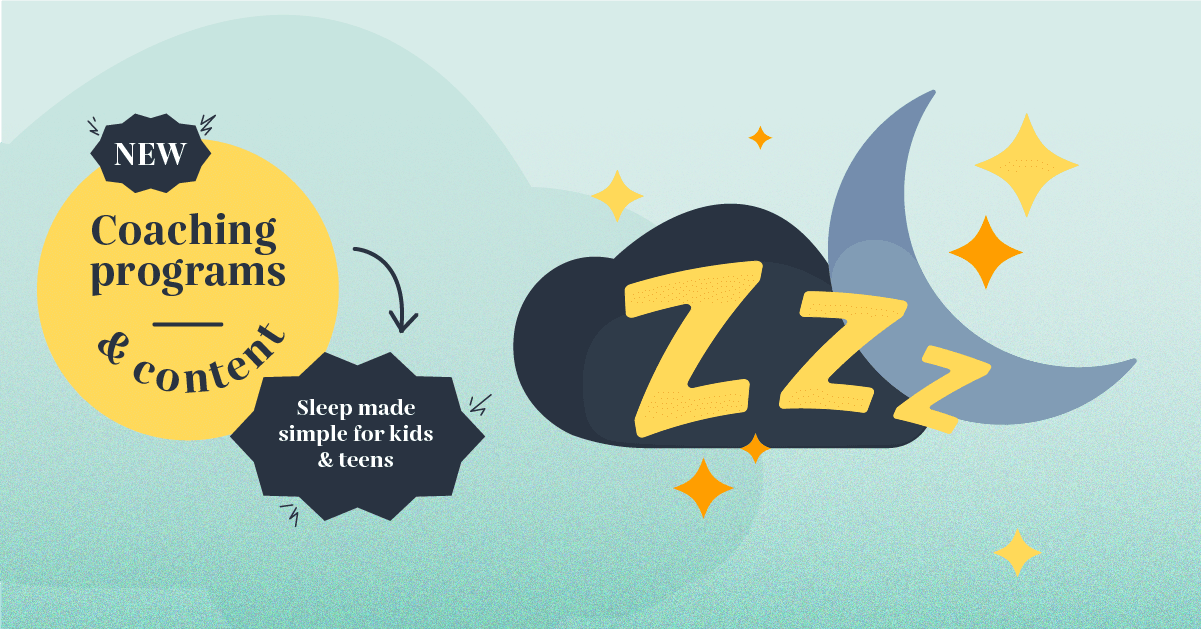Sleep Made Simple: How to get your kids (and yourself!) better sleep

By Brightline team, Jan 6, 2022
As parents and caregivers, we’re all familiar with the dreaded “bedtime bonanza.” Whether your kid is three or thirteen, getting them to sleep can be hard. Maybe your child has FOMO and refuses to go to bed before their older siblings or adults in the house; maybe your child wants to sleep, but racing thoughts and anxiety won’t let them. And for parents, we all know how stressful and exhausting it can be when you’re trying to help your kid when they’re overtired.
What keeps kids up at night?
Taking away your kid’s screen time is so much easier said than done, but the research is clear. A 2016 study found a strong association between poor sleep and use of devices like phones and tablets.
But that’s far from the only culprit: Kids were tossing and turning long before smartphones came around. Anxiety and worry can make falling asleep really difficult, and inconsistent bedtimes or bedtime routines can also make it hard to stay on track.
Why sleep matters for kids
As a parent, you already know a sleepless night means a crabby kid the next morning. But lack of sleep can have negative long-term impacts on kids, too. A 2016 study found that inadequate sleep can reduce cognitive function (think: brain power at school!) and increase the likelihood of obesity.
The research also shows that inadequate sleep in kids is connected to emotional and mental health challenges, such as anxiety and depression. A 2014 study found that sleep deprivation in adolescents increased major depression by up to five times.
Inadequate sleep can also make it harder for kids to succeed in school. When kids are overtired, their brains can’t retain information as well and they have a hard time focusing. A comprehensive study found that every type of sleep disruption was associated with decreased academic performance.”
Plus, sleep issues in childhood can lead to other behavioral health concerns later in life. Children with sleep problems often have more emotional and behavioral challenges as they grow up.
Your child’s sleep affects you, too
If your child isn’t sleeping well, chances are you aren’t sleeping well either. And that can be tough on your mental health, too, making depression and anxiety more likely. Lack of sleep and poor mental health often play into each other, so it’s even more important to focus on getting enough sleep to take care of your mental health.
How sleep (or the lack thereof) affects working parents and caregivers
The research is clear: Work productivity and performance is directly tied to sufficient sleep. A study found “significantly worse productivity, performance, and safety outcomes" among those who sleep less. And a Harvard study found that poor sleepers lost an estimated 11.3 days of productivity over the course of a year (that’s over two full work weeks!).
The benefits of a good night’s sleep
For kids, getting a good night’s sleep can make a huge difference in their mood (we’ve all heard the expression “waking up on the wrong side of the bed”). We know that kids (and adults!) are simply better able to take on the day when they’ve gotten enough sleep. And getting enough sleep consistently can improve kids’ overall emotional well-being and reduce their risk of anxiety, depression, and other mental health challenges. Kids also do better in school, are more creative, and are more likely to thrive socially when they’re well-rested.
And there are tons of benefits to your child’s physical health when they’re getting enough sleep: A stronger immune system that can ward off colds and other viruses, ensuring their growth is on track, and a decreased likelihood of obesity and diabetes.
Adequate sleep is just as important for parents and caregivers, too. When you get better sleep, your mental health will be better, and you can focus more at work. And just as for kids, getting enough sleep can boost adult immune systems and promote a healthy weight.
How to help improve your child’s sleep
Bugging your kid to go to bed early just isn’t going to work — that’s where we can help. We have tools to help you actually make a difference in your kids’ sleep, and your own.
Today, we’re launching Sleep Made Simple, a series of new coaching programs and content from our experts. Here’s what you can expect:
Sleep coaching programs: Our experienced coaches will work with you and your child in 1:1 sessions to address your child’s unique challenges. Plus, you’ll be able to text with a coach on-demand if you need a little extra support between sessions.
Hands-on training: Each coaching program includes evidence-based training modules that serve as a supplement to weekly coaching sessions and reinforce the work you and your child do with your coach.
Tools and exercises: Access meditations, breathing exercises, and useful tips to help your child calm down and get to sleep.
Progress tracking: Your child’s progress is constantly assessed and our expert coaches tailor their approaches based on your family’s unique set of needs.
Ready to get started with Sleep Made Simple? Sign up today.
Want to bring Brightline to your employees or members? Get in touch.